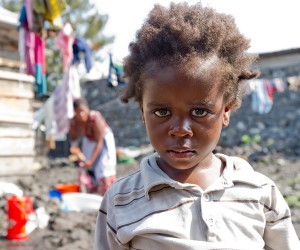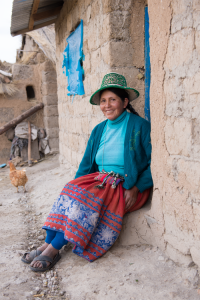‘ They’re still able to smile.’ The thought startled me, knowing that most of the 20 refugees assembled that evening at a spiritual retreat centre in the Democratic Republic of Congo had probably witnessed unspeakable cruelty.
They’re still able to smile.’ The thought startled me, knowing that most of the 20 refugees assembled that evening at a spiritual retreat centre in the Democratic Republic of Congo had probably witnessed unspeakable cruelty.
Darkness had fallen on the city of Goma, and inside the dimly-lit dining room one could even hear occasional laughter rising above the subdued conversations around us. It was the spring of 2011 and I had just arrived with a photographer colleague from Word Alive, the magazine of Wycliffe Bible Translators of Canada. I was going to interview victims of trauma to discover how they were processing their pain with guidance from Scriptures translated into their mother tongues.
As survivors of the country’s brutal civil war, the Congolese church leaders who had gathered at the retreat centre had few reasons to smile or laugh.
“They’ve lost everything,” a workshop organizer told me later. “They’re living here in Goma as displaced people with no rights, no money—it’s just very, very hard.”
The next day, a few of them shared their stories with us during breaks from the workshop.
“In one village,” said Moise Mamlaka from the Chitembo language group, “about 100 people were killed. Several people had their arms cut off and I have a family member that doesn’t have legs anymore.”
 Hearing such stories and observing the pain etched in their faces, I wondered if healing was even possible. Surely any joy they once knew had been forever ripped away, replaced by haunting images and the echoing screams of suffering friends, neighbours and family members.
Hearing such stories and observing the pain etched in their faces, I wondered if healing was even possible. Surely any joy they once knew had been forever ripped away, replaced by haunting images and the echoing screams of suffering friends, neighbours and family members.
In the days following, I glimpsed something remarkable as God used His Word, translated into their heart languages, to renew hope among the 19 men and a lone woman attending the workshop. Whether it was read, spoken or sung to sacred melodies, passages from the Bible began to touch deep places in their hearts. With them came the Lord’s assurance that He had never forsaken them, and there was a place of healing that transcended their pain.
During the workshop, participants were given slips of paper and instructed to write some key words describing their trauma. They were then encouraged to come forward and nail the papers to a cross at the front of the room. The exercise was a powerful and moving reminder that Christ had forgiven them, and He would empower them to forgive their enemies.
Another day, we visited the office and surgery of Dr. Ahuka Longombe, a Christian physician who specializes in reconstructive surgery for women who have been brutally raped. At the end of our interview, Dr. Longombe put into words what I had been struggling to express.
“We can care for these women in a medical way,” he told us, “but we cannot heal. The One who can heal is God, and the instrument we have for that is His Word. Without the Word of God, you cannot come to true healing.”
 Across the world in Southern Peru, God’s Word is transforming lives in a different way. We met Olga Sacatoomani this past November, at her home high in the Andes Mountains.
Across the world in Southern Peru, God’s Word is transforming lives in a different way. We met Olga Sacatoomani this past November, at her home high in the Andes Mountains.
“Our lives had many difficulties,” Olga told us as we sipped warm milk outside her small adobe house.
Her husband used to drink heavily and the entire family struggled with poor health. Around that time, Olga heard about literacy classes being hosted by a local church. As she began attending the classes and as she learned to read the Cusco Quechua Bible, Olga discovered that God cared for her and her family. Through His Word, she realized Christ had forgiven her sin and she could come to Him with her pain, as well as her hopes and dreams. As her relationship with Christ grew, Olga felt a growing desire to share the life-changing Scriptures with other Quechua women.
Through a Christian ministry called ATEK (“the association that shines the gospel to the Quechua-speaking world”), Olga learned how to effectively teach others. As an overseer of women’s groups in 12 area churches, she now travels regularly by horseback or on foot to lead Bible studies and hold teacher-training workshops.
Olga’s worldview shifted when she began to read and understand the Bible. Through the translated Scriptures, she perceived that God valued her and had a place for her in building His kingdom. Thousands more Quechua people are discovering Christ’s love through His Word, and in the Democratic Republic of Congo, the Bible is teaching trauma victims that the key to true healing is found through forgiveness.
“All Scripture is inspired by God,” the Apostle Paul wrote to Timothy, “and is useful to teach us what is true and to make us realize what is wrong in our lives” (2 Timothy 3:16, NLT). Paul’s statement is as true today as it was some 2,000 years ago. Today, people from every tribe, tongue, people and nation are finding hope and healing from the pages of God’s Word, when it is read and understood in their own language.







